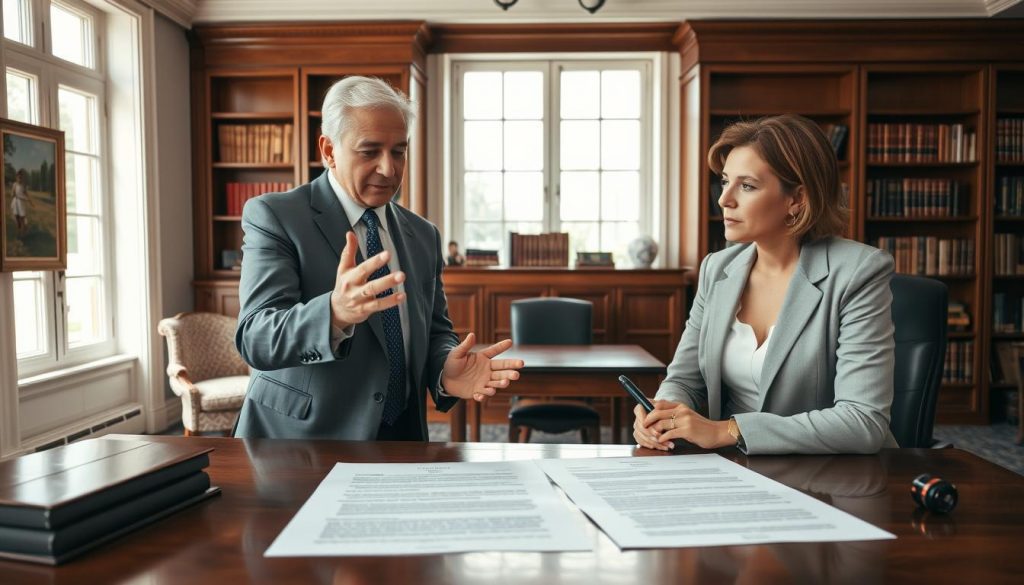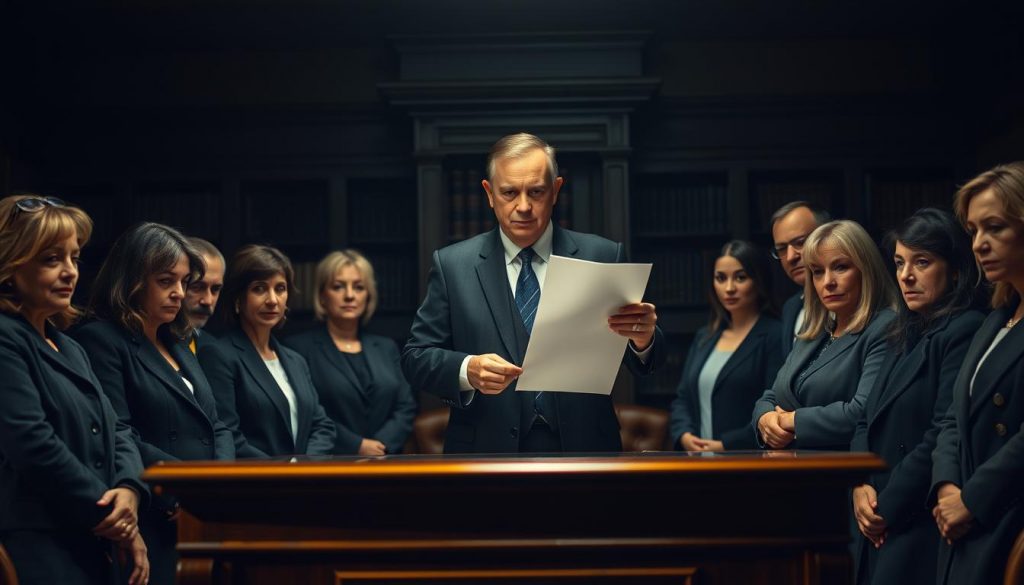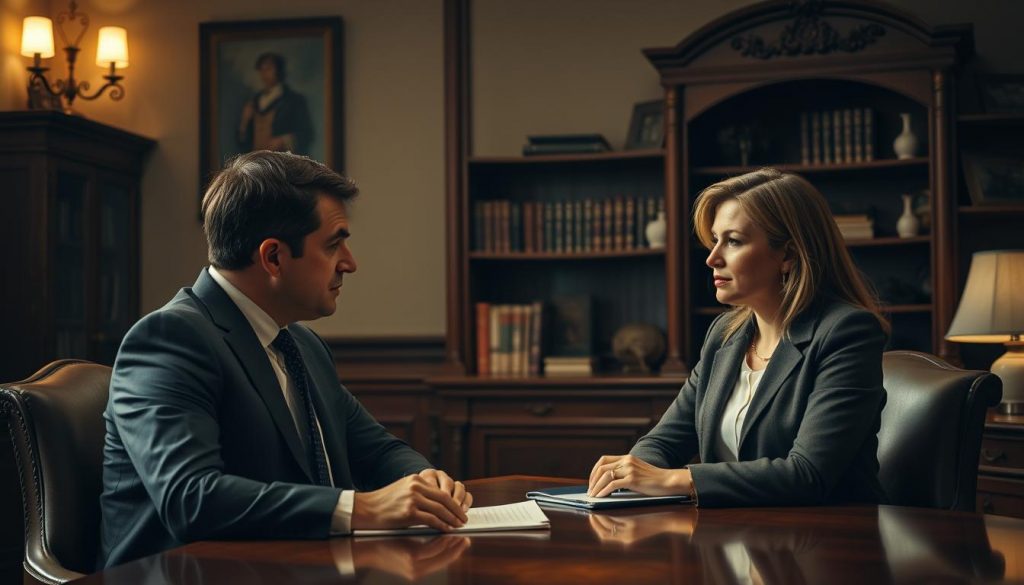When creating a Will, it’s essential to understand the legal requirements to ensure its validity. In the UK, the signature of the person making the Will must be witnessed by two independent people. This crucial step can often raise questions, particularly when it comes to beneficiaries witnessing a Will.
We understand the importance of navigating the complexities of UK estate law, particularly when it comes to witnessing wills as a beneficiary. In this article, we will explore the legal dos and don’ts, ensuring that you are well-informed about your rights and responsibilities.
Key Takeaways
- Beneficiaries should not witness a Will to avoid potential conflicts of interest.
- The role of a beneficiary and the implications of witnessing a Will are crucial aspects of UK estate law.
- Two independent witnesses are required to validate a Will in the UK.
- Understanding beneficiaries’ legal rights is vital in the context of witnessing Wills.
- Witnessing a Will requires careful consideration to avoid disputes.
Understanding the Role of a Beneficiary
Beneficiaries are at the heart of estate planning, and understanding their role is crucial for ensuring your wishes are carried out. When you create a will or establish a trust, you name beneficiaries who will receive your assets according to your instructions.
Definition of a Beneficiary
A beneficiary is someone who is entitled to benefit from a will or trust. This can include family members, friends, or charitable organizations. The beneficiary’s role is to receive the assets or benefits as outlined in the will or trust document.
It’s essential to clearly identify beneficiaries in your will to avoid any confusion or disputes. Clear identification ensures that your wishes are respected and carried out as intended.
Responsibilities of a Beneficiary
While beneficiaries have certain rights, they also have responsibilities. These can include:
- Understanding the terms of the will or trust
- Cooperating with the executor or trustee
- Receiving assets in accordance with the will or trust
Beneficiaries must also be aware of any tax implications associated with receiving assets from a will or trust.
Types of Beneficiaries
There are different types of beneficiaries, including:
| Type of Beneficiary | Description |
|---|---|
| Primary Beneficiary | The first in line to receive assets from a will or trust |
| Contingent Beneficiary | Receives assets if the primary beneficiary is unable to |
| Residual Beneficiary | Receives any remaining assets after specific gifts are distributed |
As noted by estate planning experts, “Understanding the different types of beneficiaries is crucial for effective estate planning.”
“The key to successful estate planning is ensuring that your beneficiaries are clearly identified and their roles are understood.”

In conclusion, beneficiaries play a vital role in estate planning. By understanding their definition, responsibilities, and types, you can ensure that your estate is distributed according to your wishes.
Legal Framework of Witnessing Wills in the UK
Understanding the legal requirements for witnessing wills is crucial for ensuring their validity. The legal framework governing wills in the UK is rooted in centuries-old legislation, with the Wills Act 1837 being a cornerstone.

Key Legislation Affecting Wills
The Wills Act 1837 is the primary legislation that governs the creation and witnessing of wills in the UK. This Act sets out the formal requirements for a valid will, including the need for the testator to be of sound mind and for the will to be witnessed by two independent individuals.
Key provisions of the Wills Act 1837 include:
- The testator must be at least 18 years old and of sound mind.
- The will must be in writing and signed by the testator.
- The signature must be made or acknowledged in the presence of two witnesses.
- The witnesses must sign the will in the presence of the testator and each other.
Importance of Proper Witnessing
Proper witnessing is essential for the validity of a will. If the witnessing process is not carried out correctly, the will may be contested or deemed invalid. This can lead to significant delays and complications in the probate process.
The importance of proper witnessing cannot be overstated. It ensures that the will reflects the genuine wishes of the testator and provides a clear record of their intentions. Proper witnessing also helps to prevent disputes among beneficiaries and ensures that the testator’s estate is distributed according to their wishes.
“A will is not valid unless it is signed by the testator and witnessed by two independent individuals.”
By understanding and adhering to the legal requirements for witnessing wills, testators and beneficiaries can help ensure that the will is valid and that the testator’s wishes are respected.
Can Beneficiaries Witness a Will?
In the UK, the law surrounding beneficiaries witnessing a will is clear, yet nuanced. The general principle is straightforward, but there are important exceptions and implications to consider.
Overview of the General Rule
The general rule in the UK is that a beneficiary should not witness a will. This is because witnessing a will implies that the witness is confirming the testator’s signature and capacity to make the will. If a beneficiary witnesses a will, it can lead to them forfeiting their inheritance. This rule is in place to prevent undue influence and ensure the testator’s wishes are respected.
As stated by the Wills Act 1837, “if a person attests and signs a will, they shall be rendered incompetent to take any benefit under the will.” This principle underscores the importance of independent witnesses.
Exceptions to the Rule
While the general rule is clear, there are specific exceptions. For instance, if a beneficiary is married to or in a civil partnership with one of the witnesses, they may still be able to benefit from the will. However, this does not directly relate to their role as a witness. It’s crucial to understand that these exceptions are limited and subject to specific legal conditions.
“The law does not permit a beneficiary to witness a will, but there are nuances depending on the circumstances.” –
Implications of Witnessing as a Beneficiary
If a beneficiary does witness a will, they risk losing their inheritance. This is a significant consequence and one that should not be taken lightly. The implications extend beyond the individual beneficiary, potentially affecting the overall distribution of the estate.
To avoid such complications, it’s advisable for beneficiaries to refrain from witnessing a will. Instead, they should ensure that independent witnesses are present. This not only safeguards their inheritance but also helps to validate the will.

The Benefits and Risks of Witnessing
The act of a beneficiary witnessing a will raises important questions about the potential impact on the will’s validity. As we explore this complex issue, it’s essential to weigh the benefits against the risks to ensure that the testator’s wishes are carried out effectively.
Potential Benefits for All Parties
While the primary concern is often the potential risks, there are scenarios where having a beneficiary witness a will can be beneficial. For instance, it can simplify the process by reducing the need to find additional witnesses. Moreover, it ensures that the beneficiary is aware of the testator’s intentions and can provide testimony if needed. Clear understanding and execution of the testator’s wishes are paramount, and having a beneficiary witness can contribute to this clarity.
Risks Involved for Beneficiaries
However, there are significant risks involved when a beneficiary witnesses a will. The most notable risk is that it can lead to the beneficiary being disqualified from receiving a benefit under the will. This is because the law aims to prevent undue influence or fraud. If a beneficiary is also a witness, it may raise suspicions about their involvement in the testator’s decision-making process.
- The beneficiary may be disinherited if the will is contested and the witness signature is deemed invalid.
- It can lead to legal disputes among beneficiaries, potentially causing delays in the probate process.
How Risk Can Impact Will Validity
The risks associated with a beneficiary witnessing a will can directly impact the will’s validity. If the witness signature is challenged, it may lead to the will being deemed invalid or partially invalid, affecting the distribution of the estate. Ensuring that the witnessing process is done correctly is crucial to avoid such complications. Proper witnessing is a critical component of a valid will, and understanding the rules surrounding it is essential for all parties involved.
By carefully considering the benefits and risks, we can navigate the complexities of will witnessing to ensure that the testator’s intentions are respected and carried out smoothly.
The Role of Independent Witnesses
Ensuring a will’s validity requires the presence of independent witnesses who are not beneficiaries. We rely on these witnesses to verify that the testator signed the will voluntarily, without any coercion. The role of independent witnesses is vital in maintaining the integrity of the will-making process.
Definition of an Independent Witness
An independent witness is someone who has no direct interest in the will, meaning they are not a beneficiary and are not closely related to any beneficiaries. This independence is crucial because it ensures that the witness can provide an unbiased testimony if needed.
Differences Between Independent and Involved Witnesses
The key difference between independent and involved witnesses lies in their relationship to the will and its beneficiaries. Independent witnesses are impartial and have no vested interest, whereas involved witnesses may be beneficiaries or closely related to them, potentially influencing their testimony.

In the context of witnessing a will requirements, having independent witnesses is a safeguard against potential disputes or allegations of undue influence. We must ensure that these witnesses understand their role and the significance of their independence.
By including independent witnesses in the will-making process, we can significantly reduce the risk of the will being contested on grounds of improper witnessing or undue influence. This not only protects the testator’s wishes but also provides peace of mind for all parties involved, potentially impacting probate witness testimony.
Procedures for Witnessing a Will
To guarantee that a will is legally binding, it’s essential to follow the correct witnessing procedures. Witnessing a will is a critical step that validates the testator’s intentions and ensures that the document is executed as per their wishes.
Requirements for Valid Witnessing
For a will to be considered valid, it must be witnessed by two independent individuals. The witnessing requirements are straightforward: the witnesses must be present when the testator signs the will, and they must also sign the document themselves. This step is crucial as it provides a safeguard against potential disputes or allegations of undue influence.
The witnesses should be independent, meaning they are not beneficiaries of the will or closely related to the beneficiaries. This independence is key to ensuring the integrity of the witnessing process.
Steps to Properly Witness a Will
Properly witnessing a will involves several key steps:
- The testator must sign the will in the presence of two witnesses.
- The witnesses must then sign the will themselves, confirming that they witnessed the testator’s signature.
- It’s essential that the witnesses are aware of the significance of their role and understand that they are verifying the testator’s signature.
By following these will witnessing rules, you can ensure that the will is executed smoothly and that the testator’s wishes are respected. It’s also advisable to include a witness signature on will that is clear and legible, making it easier to verify the signature if needed in the future.
Ensuring that the witnessing process is carried out correctly is vital for the validity of the will. By understanding and adhering to the witnessing a will requirements, individuals can help prevent potential disputes and ensure that their estate is distributed according to their wishes.
Common Misconceptions About Witnessing Wills
Clarifying the misconceptions surrounding will witnessing is crucial for ensuring the testator’s wishes are respected. Many people are unaware of the intricacies involved in the process, which can lead to disputes and legal challenges.
Misunderstanding Benefit Disqualification
A common misconception is that a beneficiary can witness a will without any implications. However, in the UK, if a beneficiary or their spouse witnesses a will, they risk being disqualified from receiving a benefit under that will. This rule is in place to prevent undue influence and ensure the testator’s intentions are carried out without coercion.
It’s essential for beneficiaries to understand that their role is to receive assets from the estate, not to validate the will itself. Witnessing a will is a critical step that requires impartiality to avoid any potential conflicts of interest.
Clarifying the Independent Witness Requirement
Another misconception revolves around the requirement for independent witnesses. An independent witness is someone who is not a beneficiary and has no direct interest in the will. The law requires that at least two independent witnesses sign a will to validate it. This ensures that the witnesses can confirm the testator signed the document voluntarily.
The importance of independent witnesses cannot be overstated. They provide a layer of protection against disputes and allegations of fraud or coercion. By having independent witnesses, the testator can be confident that their wishes will be carried out as stated in the will.
In conclusion, understanding the role of beneficiaries and witnesses in the context of wills is vital for avoiding potential disputes and ensuring that the testator’s intentions are respected. By clarifying these common misconceptions, we can help protect the integrity of the will and the rights of all parties involved.
Contesting a Will: The Witness’s Influence
When a will is contested, the role of witnesses becomes crucial in determining the validity of the testamentary document. Witnesses can provide testimony that significantly influences the outcome of a will contest.
Grounds for Contesting a Will
A will can be contested on several grounds, including lack of testamentary capacity, undue influence, and improper execution. Understanding these grounds is essential for beneficiaries and testators alike.
- Lack of testamentary capacity: The testator must have had the mental capacity to make the will.
- Undue influence: The testator was coerced or manipulated into making the will.
- Improper execution: The will was not signed or witnessed according to the legal requirements.
How Witnesses Affect Will Validity
Witnesses play a vital role in validating the will by confirming that the testator signed the document voluntarily and in their presence. Their testimony can be crucial in disputes over the will’s validity.
| Aspect | Role of Witnesses | Impact on Will Validity |
|---|---|---|
| Testamentary Capacity | Witnesses can testify to the testator’s mental state at the time of signing. | Supports or challenges the will’s validity based on the testator’s capacity. |
| Undue Influence | Witnesses can provide insight into potential coercion or manipulation. | Can invalidate the will if undue influence is proven. |
| Proper Execution | Witnesses confirm that the will was signed according to legal requirements. | Ensures the will’s validity if executed properly. |
In conclusion, witnesses are not just passive signatories to a will; they are crucial in ensuring its validity and can significantly influence the outcome of a will contest. Their testimony can provide valuable insights into the testator’s state of mind and the circumstances surrounding the will’s execution.
Alternative Options for Beneficiaries
Beneficiaries have several alternatives if they are asked to witness a will, and seeking legal advice is crucial. When faced with such a request, it’s essential to understand the implications of their actions and explore other available options.
Seeking Legal Advice
One of the most prudent steps a beneficiary can take is to seek legal advice. Consulting with a legal professional can provide clarity on the potential consequences of witnessing a will. They can offer guidance on beneficiaries’ legal rights and help navigate the complexities involved.
Legal advice can also help beneficiaries understand whether they can beneficiaries witness a will without jeopardizing their inheritance or the validity of the will. This expertise is invaluable in making an informed decision.
Alternatives to Witnessing
If a beneficiary is uncomfortable witnessing a will, there are alternative options available. They can suggest finding an independent witness who is not a beneficiary or directly involved in the will. This can help maintain the integrity of the will and avoid potential conflicts of interest.
Another option is to witnessing a will executor or other individuals who are not beneficiaries. This can help ensure that the will is properly witnessed without compromising the beneficiary’s position.
Beneficiaries can also consider discussing their concerns with the testator or the person responsible for executing the will. Open communication can help find a solution that respects the wishes of all parties involved.
In conclusion, beneficiaries have various alternatives when asked to witness a will. Seeking legal advice and exploring other options can help protect their interests and ensure the will’s validity.
Best Practices for Beneficiaries Involved in Wills
The involvement of beneficiaries in wills requires careful consideration of best practices to avoid potential disputes. When beneficiaries are involved in the will-making process, it’s essential to maintain transparency and properly document every step.
Ensuring Transparency
Transparency is crucial when beneficiaries are involved in the creation of a will. Clear communication among all parties is vital to prevent misunderstandings. We recommend that beneficiaries are open about their involvement and that the testator clearly understands the implications of having a beneficiary witness the will.
To ensure transparency, it’s advisable to:
- Inform all beneficiaries about the will-making process.
- Clearly document the roles and responsibilities of each beneficiary.
- Ensure that the testator is fully aware of the will’s contents and the implications of beneficiary involvement.
Documenting the Process
Proper documentation is key to avoiding disputes and ensuring the will’s validity. This includes maintaining a detailed record of the will-making process, including the witness signature on the will and the circumstances surrounding it.
When documenting the process, consider the following:
- Keep a record of the will’s signing, including the date, time, and location.
- Document the identities and roles of the witnesses.
- Ensure that the will is stored securely, with access restricted to authorized individuals.
By following these best practices, beneficiaries involved in wills can help ensure that the process is carried out fairly and in accordance with will witnessing rules. This not only protects the interests of all parties involved but also upholds the integrity of the will-making process.
Conclusion: The Importance of Clarity in Estate Planning
Clarity in estate planning is crucial for ensuring that the testator’s wishes are carried out as intended. We have explored the complexities surrounding beneficiaries and witnesses in the context of UK estate law.
Understanding the roles and responsibilities of beneficiaries is vital, particularly when it comes to witnessing a will. The question of whether beneficiaries can witness a will is a critical one, with specific legal implications. Beneficiaries’ legal rights must be considered, and witnessing a will requirements must be adhered to.
To ensure that estate planning is carried out with clarity and precision, it is essential to follow the proper procedures. For more information on estate planning and to seek professional guidance, visit MP Estate Planning. By doing so, individuals can minimize the risk of future disputes and ensure that their wishes are respected.


